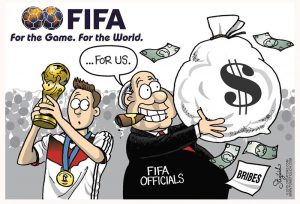FIFA’s Divide: Sport vs Business
FIFA’s Divide: Sport vs Business
Players and fans alike watch in horror as one of the greatest football nations in the world is utterly embarrassed on their home turf. Spectator’s emotions spiral out of control, ranging from uncontrollable tears to a perplexed silence. Player reactions are like those of the fans, deflating like the air out of a balloon as the score continues to mount. This was the scene of the semi-final of the 2014 World Cup between Brazil and Germany in Belo Horizonte, Brazil. The Brazilian national team was subject to their worst loss in history and their first loss on home soil in a competitive game in 39 years after the 7-1 thrashing by Germany. The historic result ended an emotional and important tournament for Brazil because of the rare opportunity to win the World Cup while playing in front of their own fans. The heart-wrenching loss is an event fans all around the world will remember for years to come. Brazilian fans put all their pride, hope, and passion into their national team, only to be left with agonizing pain.
Germany would go on to beat Argentina in the final to claim the World Cup and cap off what many people, including FIFA, would consider a successful tournament. And why shouldn’t they? The tournament attracted international attention with 3.2 billion people watching the tournament, 1 billion of which came from the final match alone. Over 3 million fans flocked to the stadiums around Brazil, providing the local economies with business from fans traveling, staying in hotels, and patronizing stores. Lesser mentioned nations such as Costa Rica received enormous attention as the team went on a fairy tale run out of the group stage and into the last eight teams remaining, the furthest in the nation’s history.
FIFA made about $4.8 billion in revenue from the tournament, resulting in a profit of $2.6 billion. As FIFA officials celebrate another “successful” tournament, the country of Brazil feels more pain, even after their devastating loss. The cost to host this World Cup cost Brazil about $15 billion, with meager help of $553 million from FIFA to help build the extravagant stadiums, roads, and airports. Infrastructure projects forced 170,000 people to leave their homes and relocate to makeshift huts that leave the already poverty stricken people without electricity or running water. In addition, FIFA only allowed licensed products from their own sponsors to be sold in the vicinity around the stadium, preventing locals from selling food, drinks, and memorabilia to match-day fans. With FIFA limiting how Brazil’s economy can recoup the huge sums of money spent to host on the World Cup, it is no surprise that citizens are left with a real average income lower today than it was before the tournament two and a half years ago.
The stark contrast between perception and reality of the 2014 World Cup shows FIFA’s business model is nothing more than a way to exploit our love of the game. Personally, this chasm between what is happening on the field and the pockets of FIFA executives has tainted how I feel about international football. Don’t get me wrong, I would spend tons of money if the World Cup came to American soil to see my team in the spotlight, but the thought about what FIFA did to the people in Brazil would always be present in the back of my head. For FIFA to solve this problem, major reform needs to happen. A long history of corruption haunts the organization and the newest president doesn’t seem any different. FIFA needs a major change in leadership, crucial transparency reform, and most importantly, support for nations after the cameras are gone. Bridging that divide might not come easily to FIFA, but it will allow fans just like myself all around the world to cheer, without any doubts, for their national team as they watch the game they love.
Sources:
http://www.bbc.com/sport/football/28223121
http://www.businessinsider.com/fifa-brazil-world-cup-revenue-2015-3
http://www.bbc.com/news/business-28881952







